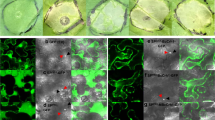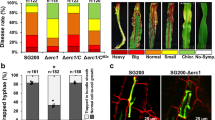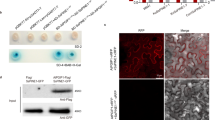Abstract
Fusicoccum amygdali Del., the pathogen of almond (Prunus amygdalus St.) and peach (Prunus persica (L.) St.) canker, causes leaves of an infected shoot to wilt and dry, besides causing cankers around infected buds and nodes. These foliar symptoms have been attributed to toxins which are produced by the pathogen at the site of infection and transported in the vascular system1. A toxin, produced in culture by the actively growing mycelium of the pathogen2 has been extracted, purified, and called fusicoccin3. It is a glucoside of a tricarbocyclic terpene with a molecular weight of 680 (ref. 4). When introduced into the xylem, fusicoccin produces symptoms in almond and peach shoots closely resembling those found after an infection of Fusicoccum amygdali2. Furthermore, if tested on cuttings or detached leaves, the toxin affects cuttings from a wide range of plants2.
This is a preview of subscription content, access via your institution
Access options
Subscribe to this journal
Receive 51 print issues and online access
$199.00 per year
only $3.90 per issue
Buy this article
- Purchase on Springer Link
- Instant access to full article PDF
Prices may be subject to local taxes which are calculated during checkout
Similar content being viewed by others
References
Graniti, A., Phytopath. Medit., 1, 182 (1962).
Graniti, A., in Proc. Symp. Host-Parasite Relations in Plant Pathology, Budapest (edit. by Kiraly, Z., and Ubriszy, G.), 211 (1964).
Ballio, A., Chain, E. B., De Leo, P., Erlanger, B. F., Mauri, M., and Tonolo, A., Nature, 203, 297 (1964).
Ballio, A., Brufani, M., Casinovi, C. G., Cerrini, S., Fedeli, W., Pellicciari, R., Santurbano, B., and Vaciago, A., Experientia, 24, 631 (1968).
Graniti, A., Proc. First Cong. Mediterranean Phytopathol. Union, Bari, 80 (1966).
Slavík, B., Čslká. Biol., 7, 347 (1958).
Procacci, R., and Graniti, A., Proc. First Cong. Mediterranean Phytopathol. Union, Bari, 87 (1966).
Turner, N. C., Pedersen, F. C. C., and Wright, W. H., Connecticut Agricultural Experiment Station, Special Soils, Bull. No. XXIX/100 (1969).
Boyer, J. S., Plant Physiol., 42, 133 (1967).
Scholander, P. F., Hammel, H. T., Hemmingsen, E. A., and Bradstreet, E. D., Proc. US Nat. Acad. Sci., 52, 119 (1964).
Zelitch, I., Proc. US Nat. Acad. Sci., 47, 1423 (1961).
Turner, N. C., and Waggoner, P. E., Plant Physiol., 43, 973 (1968).
Luke, H. H., and Freeman, T. E., Nature, 215, 874 (1967).
Livnè, A., and Vaadia, Y., Physiol. Plant., 18, 658 (1965).
Ballio, A., Graniti, A., Procchiari, F., and Silano, V., Life Sci., 7, 751 (1968).
Fischer, R. A., Science, 160, 784 (1968).
Author information
Authors and Affiliations
Rights and permissions
About this article
Cite this article
TURNER, N., GRANITI, A. Fusicoccin: a Fungal Toxin that opens Stomata. Nature 223, 1070–1071 (1969). https://doi.org/10.1038/2231070a0
Received:
Revised:
Issue Date:
DOI: https://doi.org/10.1038/2231070a0
This article is cited by
-
Hoechst-tagged Fluorescein Diacetate for the Fluorescence Imaging-based Assessment of Stomatal Dynamics in Arabidopsis thaliana
Scientific Reports (2020)
-
From plant physiology to pharmacology: fusicoccin leaves the leaves
Planta (2019)
-
Light quality modifies the expression of photosynthetic genes in maize seedlings
Photosynthetica (2017)
-
Transcriptome sequencing of Mycosphaerella fijiensis during association with Musa acuminata reveals candidate pathogenicity genes
BMC Genomics (2016)
-
Effect of fusaric acid on the leaf physiology of cucumber seedlings
European Journal of Plant Pathology (2014)
Comments
By submitting a comment you agree to abide by our Terms and Community Guidelines. If you find something abusive or that does not comply with our terms or guidelines please flag it as inappropriate.



